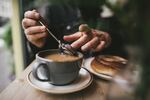
Close up of hands and cup, making tea in morning light, having breakfast in a cafe
Ida Hollis / Getty Images
It was an innocent little detail, backed by centuries of science, in a chemistry book about tea. Something American author Michelle Francl never anticipated would cause a stir, or a brewhaha — and land the U.S. Embassy in hot water.
Researching her new book, Steeped: The Chemistry of Tea, Francl analyzed caffeine levels and studied the molecules that give tea its aroma. She uncovered the little-known presence in tea of other chemicals, including fluoride and aluminum. And she pored over an 8th century Chinese manuscript that called for salt to be added to the boiling water.
"Turns out, the sodium ions in the salt block our perception of bitterness — the receptors for bitterness in your tongue and your mouth," says Francl, a chemistry professor at Bryn Mawr College in Pennsylvania. "So if you put a tiny bit of salt in — not enough to taste — you make the cup of tea or coffee smoother and less bitter."
The recipe for a perfect cup of tea, she wrote in her book, includes a pinch of salt. And for tea with milk, Francl recommends warming the milk first, so that it doesn't curdle when it hits the hot water.
Sounds harmless, right?
But anyone with British friends and loved ones — or who's spent more than five minutes in the United Kingdom — will know that recipe amounts to blasphemy. Within hours of the publication of Francl's book Wednesday, face palm emojis were ricocheting across the British Isles.
"Hot milk and salt!? Who is this person?" talk radio host Toni McDonald exclaimed on BBC Radio Hereford and Worcester.
"This scientist reckons that the only way to have a decent cup of tea is with a pinch of salt? That's lunacy!" another radio host, Vic Minett, said on BBC Radio Coventry.
One of her call-in guests was Jane Pettigrew, the holder of many tea titles: director of studies at the U.K. Tea Academy, recipient of multiple World Tea Awards and contributing editor of TeaTime Magazine.
"I've just made myself a cup of tea with some salt in it," Pettigrew told listeners. "I have to say, I don't like it much. It's bizarre!"
It's been about 250 years since the last time Americans spoiled a whole lot of British tea by dumping it into salt water, in Boston Harbor. To allay fears of a revolution this time around, the United States Embassy in London intervened, and scrambled to issue a press release — calling tea the "elixir of camaraderie" and a "sacred bond" that unites Britons and Americans.
"We want to assure the good people of the U.K. that the unthinkable notion of adding salt to Britain's national drink is not official United States policy — and never will be," the embassy's public affairs officer, Rodney Ford, told NPR.
An important statement on the latest tea controversy. 🇺🇸🇬🇧 pic.twitter.com/HZFfSCl9sD
— U.S. Embassy London (@USAinUK) January 24, 2024
But there's one line at the end of the statement that gave Brits pause:
"The U.S. Embassy will continue to make tea the proper way — by microwaving it."
In response, to the statement put out by the US Embassy in the UK:
— Cabinet Office (@cabinetofficeuk) January 24, 2024
We appreciate our Special Relationship, however, we must disagree wholeheartedly...
Tea can only be made using a kettle. https://t.co/Jt5xWKYRkT
(Full disclosure: The U.S. Embassy staff have a sense of humor.)
As for the scientist at the center of this scandal, Francl says the reaction "mostly seems all in good fun."
"People are taking it with — I'm going to make a terrible pun again — a grain of salt," she tells NPR.
NPR producer Fatima Al-Kassab contributed to this report.
Copyright 2024 NPR. To see more, visit https://www.npr.org.